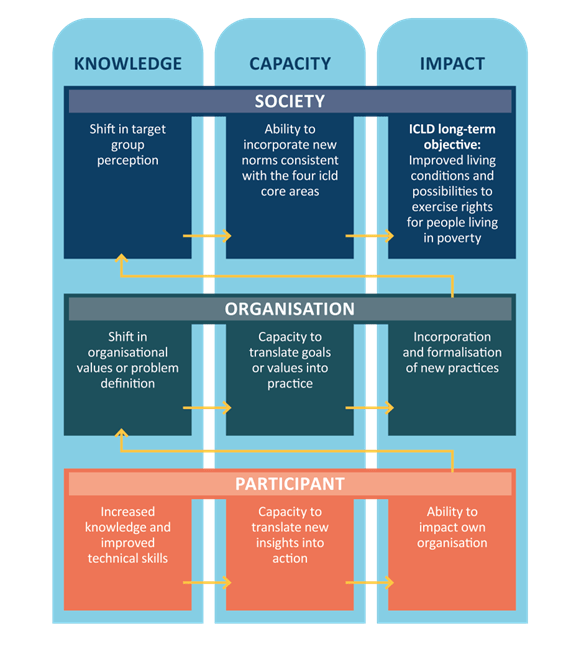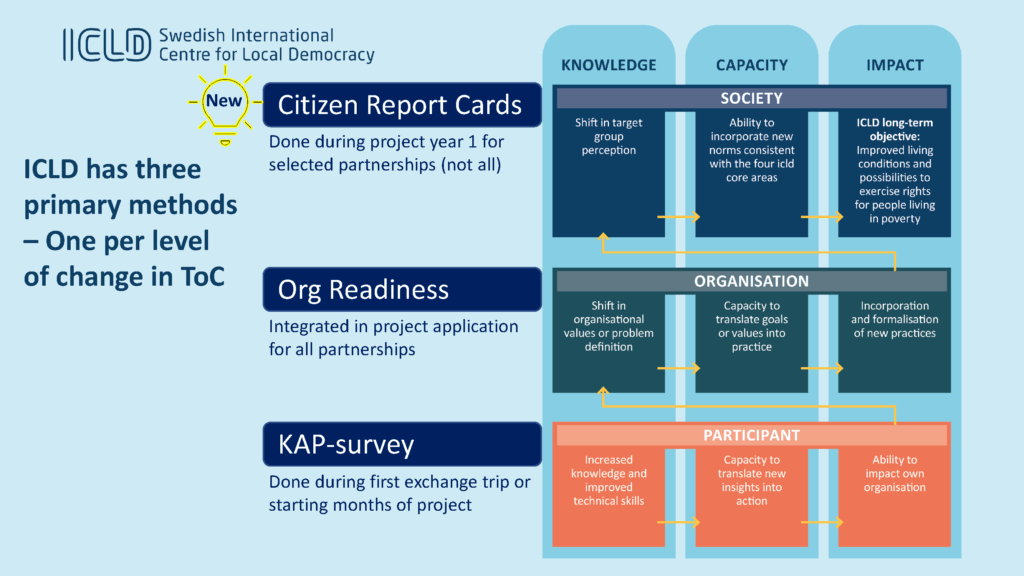ICLD’s Monitoring, Evaluation, and Learning (MEL) framework is central to our mission of strengthening local democracy worldwide. Through systematic MEL practices, ICLD ensures its programs and partnerships are effective, impactful, and continuously evolving to meet the needs of local governments and their communities. By collecting data, analysing progress, and fostering knowledge sharing, MEL drives informed decision-making, accountability, and organisational learning.
Theory of Change
The ICLD Theory of Change is a strategic framework used to map out how and why positive change is expected to occur. It helps us create impactful and realistic action plans by clearly identifying the steps involved in achieving desired outcomes.
Our Theory of Change is a valuable tool for guiding decision-making and ensuring that every action taken is strategically aligned with the desired outcome, while also allowing for critical reflection and adaptation.
Participant Level
- Knowledge: At the individual level, the focus is on increased knowledge and improved technical skills. This includes participants gaining new insights into local democracy, governance, and service delivery.
- Capacity: The participants are then equipped with the capacity to translate their new knowledge into actionable steps, such as initiating or supporting governance reforms.
- Impact: Individuals use their enhanced capacity to make tangible contributions to their organisations or local contexts, driving meaningful changes.
Organisation Level
- Knowledge: At the organisational level, there is a shift in organisational values or problem definition. This involves adopting new ways of thinking or reframing existing challenges in alignment with democratic principles.
- Capacity: The focus is on building the capacity to translate goals or values into practical actions, enabling organisations to operationalise their learnings.
- Impact: Over time, organisations formalise and incorporate new practices into their operations, contributing to more democratic governance and improved service delivery.
Society Level
- Knowledge: At the societal level, the goal is to achieve a shift in the target group’s perception, ensuring that communities recognise and embrace the four ICLD core areas—equity, participation, transparency, and accountability.
- Capacity: Societal capacity refers to the ability to incorporate new norms consistent with democratic principles, fostering inclusive and participatory governance at the local level.
- Impact: The ultimate long-term objective is to improve living conditions and expand opportunities for people in poverty to exercise their rights, creating a more equitable and democratic society.

The framework demonstrates a flow where:
- Knowledge builds capacity, enabling participants to act.
- Capacity leads to impact, ensuring long-term institutional and societal changes.
- Changes at the participant level ripple out to organisations and society, showcasing how individual learning can catalyse systemic transformation.
This tiered approach ensures that ICLD’s efforts are comprehensive, targeting immediate learning outcomes while also fostering sustainable and scalable democratic progress.
ICLD Methods
ICLD employs three primary methods to align with its Theory of Change (ToC), addressing each level of change: Participant, Organisation, and Society. These tools ensure a comprehensive approach to measuring progress, fostering capacity-building, and creating impact.

1. Citizen Report Cards
- Level of Change: Society
- Purpose: Conducted in Year 1 for selected partnerships, CRCs capture citizen feedback on local governance and service delivery, emphasising transparency, participation, equity, and accountability.
- Outcome: Insights from CRCs help local governments improve democratic practices and public services by incorporating citizen-driven feedback into policies.
2. Organisational Readiness
- Level of Change: Organisation
- Purpose: Integrated into the project application process for all partnerships, Org Readiness evaluates the capacity of organisations to adopt and implement democratic values.
- Outcome: Strengthens organisations’ ability to define goals, implement changes, and institutionalise new practices.
3. Knowledge, Attitude, and Practice Survey
- Level of Change: Participant
- Purpose: Conducted during the first exchange trip or early months of a project, KAP surveys assess participants’ baseline knowledge, attitudes, and skills related to local democracy.
- Outcome: Helps track individual progress in translating knowledge into actionable skills that drive organisational and societal change.
How These Tools Fit into the ToC Levels
- Participant: The KAP survey measures knowledge acquisition and individual capacity-building, fostering the ability to contribute to organisations effectively.
- Organisation: Organisational readiness focuses on enabling organisations to transform values into practical governance changes.
- Society: CRCs ensure that societal perceptions, norms, and practices align with ICLD’s four core areas—equity, participation, transparency, and accountability—ultimately driving systemic impact.
For more information or to collaborate with ICLD on MEL initiatives, please contact:
Robin Alnäs
Research Coordinator, Knowledge Centre
Email: robin.alnas@icld.se

